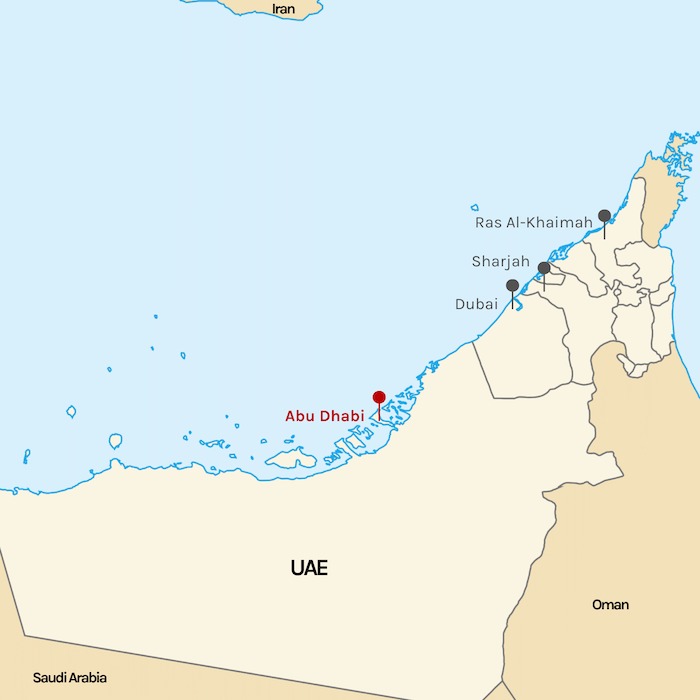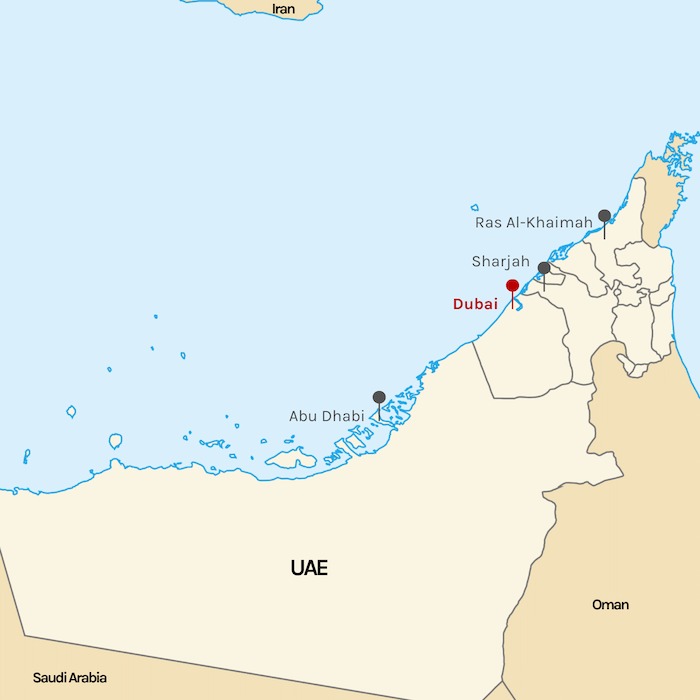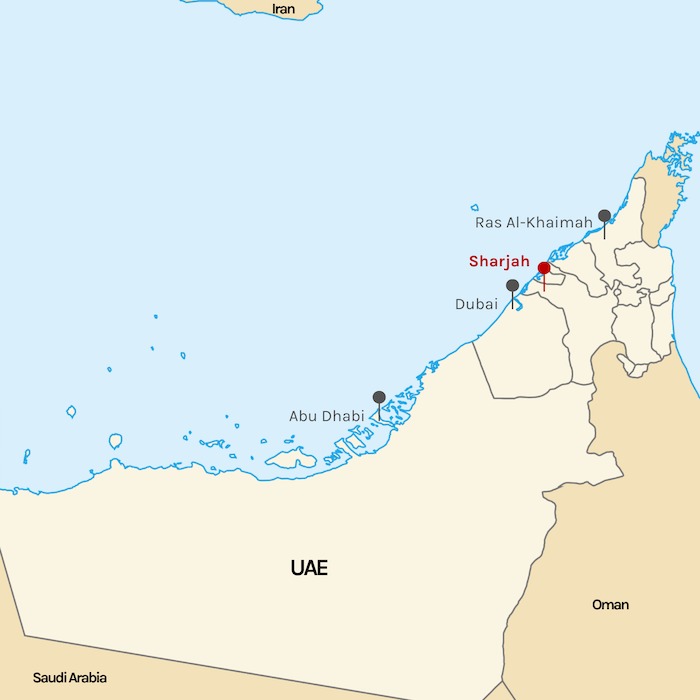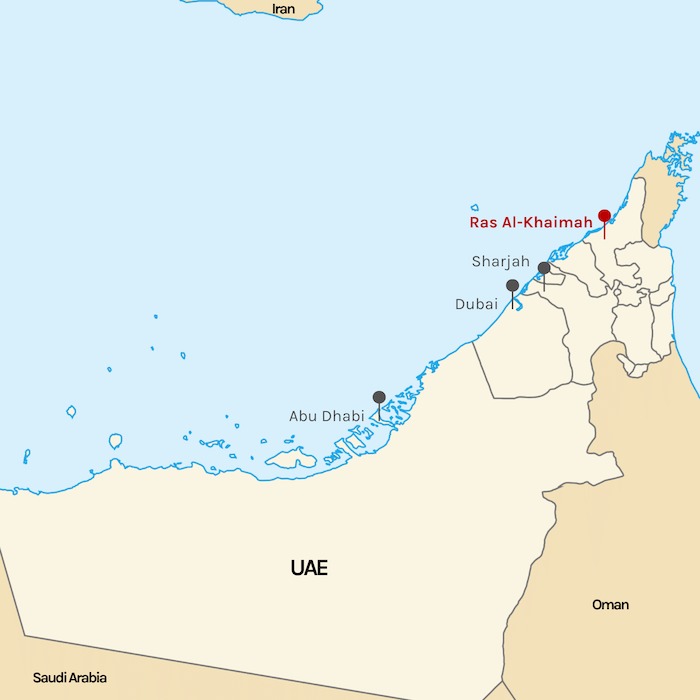Teach English in the United Arab Emirates
Enjoy a high salary, great quality of life, and warm beaches in the UAE
Why teach English in the UAE?
High salaries, high quality of life, warm weather, and unique experiences. Teaching opportunities are opening up in the best cities in the UAE, providing you with great career development with amazing benefits!
A few facts about the UAE:
Approximately 80% of the UAE population is comprised of expatriates. Both Abu Dhabi and Dubai are the fastest growing and modern cities of the UAE, Abu Dhabi claims to have the majority of the oil reserves in the country and Dubai is seen as the financial hub of the country. Both cities are top tourist destinations and very desirable for expats to live in, which is one reason that had led to economic growth. Ajman, on the other hand, is a small up-and-coming emirate that has been growing steadily in prominence.
Arabic is the official language in the UAE, although English is widely spoken and road signs are all in both English and Arabic. The majority of the local citizens follow the Islamic religion and are surprisingly open-minded to other religions as you will find Christian churches spread around each Emirate. Regarding climate, it is quite comfortable with a temperature range of 11 to 25 degrees Celsius from October through March, and in the summer, the weather reaches an average temperature of between 45-47 degrees Celsius.
Overview
Requirements to teach in the UAE:
- Hold a relevant Bachelor’s degree
- 1+ years of teaching experience for K-12
- Native English speaker
Average monthly salary in the UAE:
10,000 – 20,000 AED / month
This varies based on experience, hours worked, and the type of school that you work in.
Cost of living per month in the UAE:
8,200 – 23,000 AED / month
This varies by lifestyle and city that you choose to live in.
Opportunities for teachers
There are countless opportunities for teaching jobs in UAE, teaching jobs in Dubai and teaching jobs in Abu Dhabi. The majority of the openings are for licensed teachers in all subject areas either in public or private schools. UAE has become one of the most popular locations for teaching abroad. Most of the schools prefer or require a 2-3 year contract while offering a great salary with great benefit packages including accommodation, flights, health insurance and education allowances for dependents. It is a great place to start with if you want to save some money and get some great travel experience. Teaching Nomad has teaching jobs in Dubai, Abu Dhabi, Ajman, and others!
Salaries for teaching in Dubai and UAE often range from $35,000 – $55,000 USD/annually, considerably more for administrators. Compensation packages usually include housing or a housing allowance along with relocation money and end of contract bonuses.
Curriculums used in the UAE
There are many different types of schools in the UAE, and they use a variety of different curriculums. It’s important to know a little bit about each curriculum so you can choose the one that you’re most comfortable teaching and search for an overseas teaching job based on your preference. Even if you don’t have a preference, it’s helpful to understand which curriculums you may run into while teaching in another country. Some of the most common curriculums taught in the UAE are IB, U.S./AP, local, and the National Curriculum for England.

Teaching IB in the UAE
As of 2020, there are 48 schools in the UAE that use the IB curriculum. This equates to over a thousand IB teaching positions, many of which are available to foreign teachers. Learn more about teaching IB in the UAE, and check out the history and an overview of teaching IB abroad in our blog.

Teaching AP in the UAE
There are many schools in the UAE that offer AP courses to students. To be able to offer AP courses, a school must submit its curriculum to the AP program to ensure that the proper standards are being met. Teachers must prepare their students for the AP exams that usually take place within the first two weeks of May.

Teaching the local curriculum in the UAE
United Arab Emirate’s public/government school system has gone through some major changes in recent years including the recruitment of foreign teachers for instruction of English language as well as other subjects. UAE national curriculum includes standard global subjects as well as moral education, Islamic education, UAE social studies, & even private schools that must offer Arabic as a second language.

Teaching the National Curriculum for England in the UAE
The National Curriculum for England is the set of standards used to through England & Wales to ensure that all children are learning the same things as they move through schooling. The curriculum is set out in 4 required key stages for students ages 5 – 16. With an optional key stage 5 for ages 17 & 18 (years/grades 12 & 13). Students attending international schools almost always include key stage 5, also known as college, in the British sense of the word.
The curriculum defines the fundamental aspects of learning including the subjects to be taught, the knowledge, skills, and development with each subject. The level of ability students are expected to achieve in the subject, and lastly how students will be assessed. With that framework, schools are free to plan and organize lessons as they see fit.
Accreditation for the National Curriculum for England comes directly from the UK Department of Education and includes a scheme for overseas schools, called BSO’s (British Schools Overseas) to verify they meet the standards of UK schools.
Why consider teaching in the UAE?
The teaching job market in the UAE is constantly expanding and lucrative. This means that there are plenty of different teaching jobs to choose from, and you’ll be able to save a healthy amount of money while you experience a new country and culture! Plus, due to English being the language of business and the UAE being a global business hub, there’s a minimal language barrier. There’s also a thriving expat community in the UAE, as it’s a very popular teaching destination for foreigners – so you’ll meet people from all over the world!
Cultural differences:
UAE may not be as conservative as Saudi Arabia, but there are a couple of things you should know in order to get you started. In most cities of the UAE, you can consume alcohol in bars, restaurants, and hotels, except in Sharjah where you pay high penalties and get deported if you get caught to be drinking alcohol publically or privately. Before you can buy any alcohol, you will need to obtain an alcohol license to buy and consume alcohol in the UAE. An important tip for the non-Muslims during the Ramadan season is that you should NOT eat, drink or smoke in public places from sunrise to sunset, and most of the restaurants are closed during the day.
Abu Dhabi is full of palm trees, beautiful flowers, and green grass. The scenery is breath-taking, and Abu Dhabi is one of the biggest emirates in the UAE. This means that you’ll meet diverse groups of people and have access to some western amenities.
Teaching in Abu Dhabi will be an exciting adventure from start to finish. It will be challenging to get used to the lifestyle and culture, but you’ll likely be teaching in a modern school that works hard to provide top tier education for its students. This means that you will be expected to work hard, and strong classroom management skills are required.
Teachers that go to Abu Dhabi to teach say that it was one of the best experiences of their lives. The students can be rowdy but teaching here provides the perfect opportunity to gain invaluable experience. The education system in the Middle East is undergoing constant reform, and you’ll get to be a part of that!
Dubai has quickly become one of the most popular destinations for foreigners, whether for long-term stays or short trips. People are drawn to its beautiful beaches, low crime rate, and flourishing skyline. Teachers, in particular, are excited by the possibility of teaching in Dubai because of its tax-free salaries.
Every day thousands of businesspeople and foreigners fly in and out of the country, and the business sector is growing almost as rapidly as the skyline. This creates a high demand for English teachers, as the importance of being able to speak and read the language becomes more crucial with every passing day.
When you think of Dubai, you may think of glitz and glamour. From the beaches to Lamborghinis to endless shopping malls, the whole city sparkles with innovation. The students are diverse, as people come from all over the world to live in the city. This also provides endless opportunities for teachers looking to go on an adventure and teach in Dubai!
Schools in Dubai are constantly looking for teachers that specialize in all sorts of subjects! The main thing to remember about teaching in the UAE is that you need to hold a degree that matches the subject that you teach. For example, if you’d like to teach biology, you need to hold a degree in biology.
The tax-free salary is a huge plus, but the cost of living in Dubai is pretty high. Rent and groceries are expensive, but budgeting carefully will ensure that you save however much money you’d like.
Sharjah is a dry and conservative emirate. It shares a border with all 6 of the other emirates as well, so traveling between them (especially to Dubai) is quite easy! Sharjah is the cultural capital of the Arab World, and people that live there absolutely love it.
A few interesting facts that teachers love are:
The UAE’s first schools were set up in Sharjah in 1907. It’s called Al Tamimiya School, and its establishment is a very important part of Sharjah’s history.
The UAE’s first library was also established in Sharjah in 1933. It’s called Al Taymeya, and there’s a lot of history behind it.
There’s a large number of expats that live in Sharjah, so it’s likely that many of your colleagues in your new school will be foreigners. Living in Sharjah also comes with convenient access to schools, hospitals, grocery stores, entertainment, and restaurants.
Ras Al-Khaimah is an emirate that values community, and you’ll find that your neighbors and colleagues will really try to get to know you. Joining groups online for expats in RAK will help you to find and make new friends as well.
Teachers in this emirate have an excellent work-life balance, and they get to enjoy the beautiful sunny weather and nearby beaches in their off-time. You will likely want to invest in a car or make friends with someone that’s willing to share or drive you around.
Teachers that have gone to teach in RAK have said that it’s less hectic than it is in bigger emirates. This gives teachers more time to enjoy the mountains, beaches, and desert landscapes found throughout the UAE.
A good place to meet other expats is Al Hamrah where there are themed nights and brunches on the weekends.
RAK currently has about 10 international higher education institutes as well as many private/international schools with different curriculums such as American, British, Arabic, and Indian. The education sector in Ras Al Khaimah is constantly growing and developing, so if you plan on staying to teach here for a while, you’ll likely see improvements and changes within the systems in place.




Types of schools in the UAE
Foreign teachers have tons of teaching options in the UAE. You can teach at any type of school such as preschools, kindergartens, international schools, public schools, and universities. No matter what kind of school you have experience in or what kind of school you want to start teaching at, you’ll have a plethora of options in the UAE.
Preschools and kindergartens in the UAE
The name says it all, the children in these institutions are 18 months to 6 years old. Teaching English in a kindergarten or preschool is a very common job in the UAE.
Teachers can expect a friendly working environment and a teaching assistant in the classroom with them. There will be plenty of fun teaching materials available and little time is needed for preparation. Classes typically have 8-20 young learners and are between 20-40 minutes long.
International schools in the UAE
These schools are where professional expats and wealthy locals send their children. Tuition for the students is high and enrollment is very competitive. This means that teacher remuneration is fantastic (especially if you have children) but these jobs will often require a teaching license and graduate degree.
Classes are held on the traditional two-semester schedule and almost all classes are taught in English. These schools often require a 2-year commitment from the teachers. Most International Schools will follow either the International Baccalaureate (IB) or the foreign (A-level/AP etc.) curriculum, so teachers with experience and familiarity with these curricula are preferred.
Public schools in the UAE
Public schools (particularly in bigger cities) score well on all fronts. Decent salary & benefits, reasonable teaching load, and more paid vacation days. Jobs in this category will sometimes require a graduate degree and/or a teaching license.
Universities in the UAE
There is a lot of variety within these jobs. Positions at smaller universities usually hire foreign teachers to teach required English classes, some universities are less selective when it comes to hiring foreign teachers. Even if the university originally hired you to teach a specific subject, entry-level teachers will rarely be teaching anything other than oral English. Salaries are usually between 10,000-20,000 RMB/ month (dependent on location and experience), but teachers are paid during the summer and winter breaks and never have to teach more than 20 periods a week. Jobs at universities are therefore more competitive than English training centers. The university curriculum is flexible and the foreign teacher is responsible for creating teaching materials.
High-ranking public universities, especially in big cities, are a different story. Salary and benefits will be much higher but you may be expected to possess an advanced degree and considerable relevant teaching experience.
Schedule and start dates
K-12
Fall starts in August/September
Spring starts in March
University
Fall starts in August/September
Spring starts in March
K-12 schools work on a similar schedule as western countries with the fall semester starting in late August and the spring semester starting around March. For fall positions, we suggest applying 4-5 months in advance and 2-3 months in advance for spring. No matter your schedule, we’ll be able to help find the best teaching opportunities available.
Salary and benefits while teaching English in the UAE
There are many different types of schools to choose to work at in the UAE, so you’ll want to do a little research on each one to figure out which type will best suit your lifestyle, salary, and time-off needs. There are often trade-offs that you will need to consider with each type of school. For example, if you want a higher salary, you’ll need to work more hours, so maybe you should consider an international school. However, if you want more time off, you may want to work at a university where you’ll have less working hours and a lower salary.
Here’s how experience & qualifications can affect your earning potential:
Bachelor’s Degree:
This is one of the minimum requirements for teachers in the UAE. Additionally, if you are looking to teach in a private school, your degree will need to match the subject you teach. Recent education graduates with the right degree should expect a starting salary of no less than 9,000 AED + housing.
TEFL/TESOL Certification or 1-year teaching experience:
A TEFL/TESOL certification is not typically a requirement for the UAE since most schools are looking to hire teachers with government-issued teaching licenses and/or education degrees. However, if you do not have experience teaching ESL students, taking a quality TEFL course will teach you strategies to better connect with your learners.
Regarding experience, this varies by the emirate. Some require 2-years post-graduate experience, some require 1 year, and others can hire recent graduates.
Teaching license and/or degree in education:
If you are licensed to teach in your own country, the sky is the limit in the UAE. Salaries typically start at 10,000 AED and can go up all the way to 20,000 AED a month or more.
Post-graduate degree:
An M.Ed or PGCE will definitely help you stand out in the UAE job market. Expect higher pay and more opportunities for advancement.
Location:
Teaching opportunities are available all throughout the UAE with high demand for high-quality international education in every Emirate. Many teachers will want to live the modern metropolises of Dubai & Abu Dhabi but you can expect a higher cost of living in those cities. If saving money and avoiding traffic is a high priority for you, consider lesser-known cities like Ras Al Khaimah or Al Ain. While the cost of living is significantly lower, the pay is still competitive. The UAE is not a big country, only slightly bigger than the state of Maine. Almost anywhere you want to go is within a 2-hour drive.
Hours:
The UAE generally follows an early school day to avoid some of the heat. Expect to start around 7 am and finish by 2-3 pm. The schedule follows the Islamic schedule of Sunday – Thursday (Friday & Saturday as the weekend).
Benefits:
Benefit packages in UAE are often quite lucrative. You can usually expect housing to be provided (or allowance), annual flights, medical insurance, end of contract bonus and discounted tuition if applicable.
Document Legalization
In order to get a visa to teach in the UAE, you must get some of your teaching documents legalized by the UAE Embassy. This can be a difficult process on your own, so we now offer a service that gets it done for you, hassle-free!
FAQ’s
Do I need to speak another language in UAE?
It is not required to speak another language, but learning the basics of Arabic, the official language, would be helpful. English is used amongst business and public professionals.
What’s the weather and temperature like?
Though the climate is desert it can be very pleasant during the winter months. The climate is quite comfortable with a moderation of 11 to 25 degrees Celsius (51 – 77 Fahrenheit) from October till March, as for the summer the weather reaches get very hot with highs 45-47 C (113-116 F) degrees.
How long is the process to find a job?
Once you’re ready to begin the process, we here at Teaching Nomad will start searching for teaching positions based on your experience, credentials, interests, and needs. The UAE follows the same school schedule as western countries with the school year starting in August. Therefore the peak hiring season is October – May. Applications are encouraged year around and there are always some openings for the Spring semester..
What about a work visa?
All employers Teaching Nomad works within the UAE, offer a work visa. We will make sure to keep you informed during the processing and make sure all your paperwork is filed correctly. Learn how to get your documents attested in order to get a work visa in the UAE here.
What are the requirements to teach in the UAE?
Government-run schools in UAE always require a formal teaching license from your home country. Private schools also usually require this, but can sometimes be more flexible. However, as a general rule, a teaching license and/or degree in education will be required. A minimum of 2 years of experience in your subject field is also usually required.
Should I be worried about my health? Do I need vaccines?
The UAE is a developed nation with no outstanding diseases or outbreaks. For anyone with special requirements, consider consulting with your doctor about having your vaccines and immunizations up to date. It is also mandatory that all expats have health insurance – which your school will provide.
Why should I teach English in UAE?
Teaching English in the UAE can be very rewarding. Not only will you travel across the globe to experience a new culture, but you’ll be compensated with high wages, great accommodation, and the ability to teach English in a welcoming environment.
What type of teaching jobs are available?
The UAE has a wide range of teaching positions available. Teaching positions will be within the UAE public school system or privately owned mainstream (K-12) school. Foreign teachers are needed for all subjects including math, history, science, English, and more. Also, you may work with learners from K-12 as well as University level.
Are there many foreigners in the UAE?
Yes, the UAE has one of the highest expat to local ratios in the world. In the public school system, foreigners compose between 25-35% of the teaching staff. Also, the overall population is expatriates, with more than 70% of the general population.
What our teachers are saying
I’d highly recommend Teaching nomad because it is a reputable, international agency that has teaching opportunities all over the world. Their website is easy to use, the consultants are attentive and help you throughout the process. I’d choose them all over again.
I was helped by Moira, and the support provided to me was second to none. I’m super grateful for the support. Finding a job during this difficult period would have been a challenge on my own, however, the assistance from Teaching Nomad made the process much easier. They also offered continuous support once I started working. They have been absolutely fantastic.
TN helped me from the very start, which for me was trying to decide which TEFL certification to go with. From there my consultant, Moira, helped me with the documents I needed, gave me resume tips, sent off my profile to various schools even before my certification was complete, and gave me interview tips when the schools wanted to meet me. Thanks to the help Moira and Teaching Nomad provided, I have just signed a contract with a higher than normal salary for a first-time teacher. Now they are helping me out with authenticating my documents and my application for a visa!
Blogs about teaching in the UAE
Learn all about teaching, traveling, and living abroad!
No Results Found
The page you requested could not be found. Try refining your search, or use the navigation above to locate the post.
Ready to get started or still have questions?
Register now to speak with a personal placement consultant!


